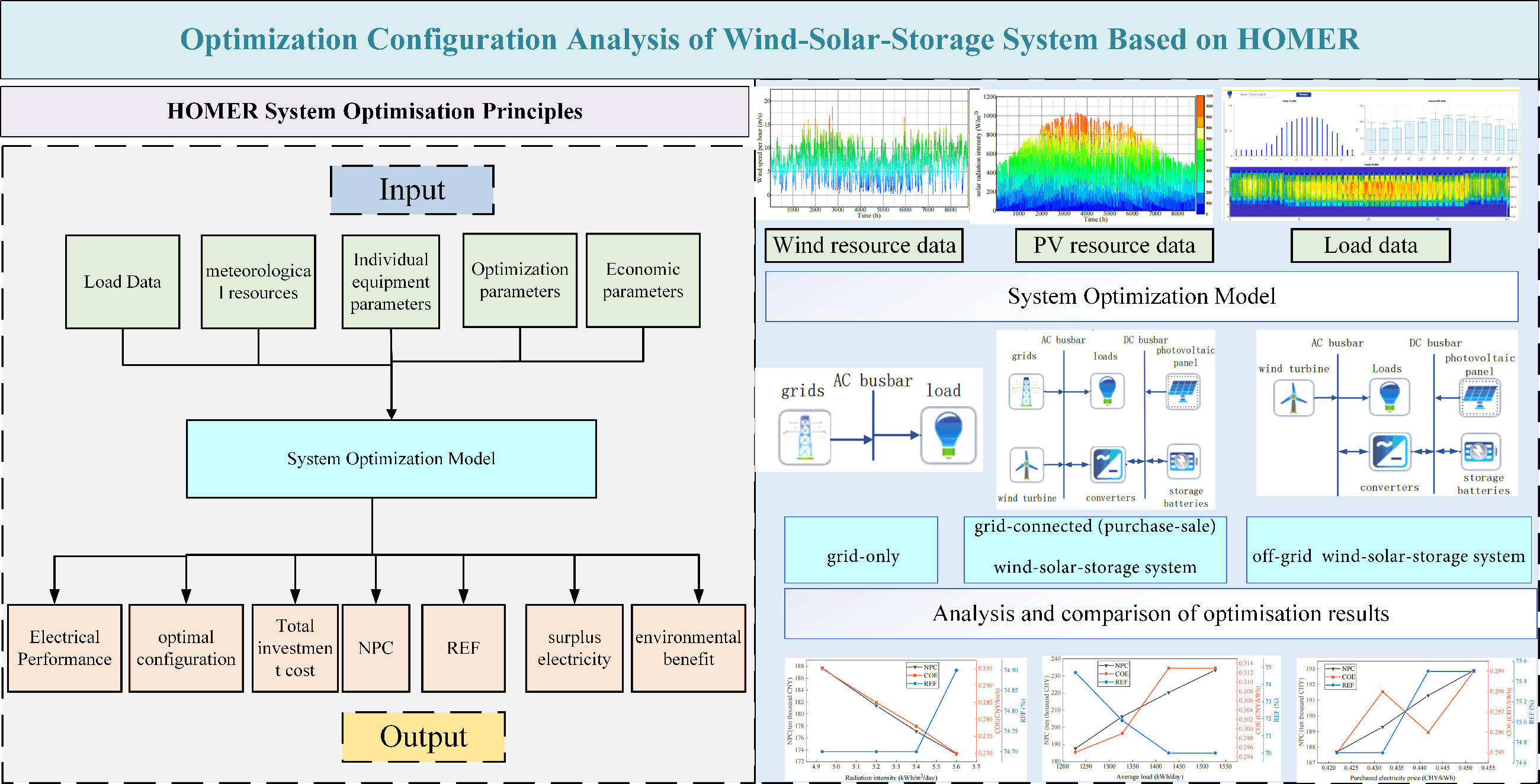 Open Access
Open Access
ARTICLE
Optimization Configuration Analysis of Wind-Solar-Storage System Based on HOMER
1 College of Energy and Power Engineering, Inner Mongolia University of Technology, Hohhot, 010051, China
2 College of Electric Power, Inner Mongolia University of Technology, Hohhot, 010080, China
3 POWERCHINA BEIJING Engineering Corporation Limited, Beijing, 100024, China
* Corresponding Author: Yan Jia. Email:
Energy Engineering 2025, 122(5), 2119-2153. https://doi.org/10.32604/ee.2025.061712
Received 01 December 2024; Accepted 27 January 2025; Issue published 25 April 2025
Abstract
HOMER (Hybrid Optimization Model for Electric Renewables) is an effective simulation and optimization platform for hybrid renewable energy. By inputting specific users’ energy resource data (such as wind speed, solar radiation, etc.) and load data, and by determining the types and models of components selected by the user, HOMER calculates and simulates the operational status of each component at every time step. Ultimately, it computes the energy balance of the system within specified constraints to simulate the overall system operation. This approach enables the reasonable determination of system component capacities, the evaluation of system feasibility, and the calculation of costs over the entire lifecycle of the system. In response to the challenges of matching capacities and high construction costs in wind-solar-storage multi-energy complementary power generation systems, This paper addresses issues such as difficulty in matching component capacities, high construction costs, and low system reliability in multi-energy complementary power generation systems. Using the HOMER hybrid renewable energy simulation and optimization platform, we constructed various hybrid energy systems for a specific region and considered multiple power supply modes. The software was used to solve for the optimal capacities and costs of each system. Four scenarios were analyzed: grid-only, grid-connected (purchase-sale) wind-solar-storage system, grid-connected (sale) wind-solar-storage system, and off-grid wind-solar-storage system. The results were compared and analyzed. HOMER can assess system feasibility and calculate the cost over its entire lifecycle. By inputting 8760 h of wind and solar resource data and load data for a specific region, and considering multiple system structures and power supply modes, the configuration results were evaluated using indicators such as cost and renewable energy utilization ratio. The simulation results indicate that the Net Present Cost (NPC) values across four different scenarios range from 1,877,292 CNY to 3,222,724 CNY, demonstrating significant cost differences. Among these scenarios, the grid-connected (purchase-sell) wind-solar-storage system exhibited the lowest NPC and the highest renewable energy utilization rate. Compared to a system relying solely on the grid, the NPC was reduced by 305,695 CNY, and the renewable energy utilization rate reached 74.7%.Graphic Abstract

Keywords
Cite This Article
 Copyright © 2025 The Author(s). Published by Tech Science Press.
Copyright © 2025 The Author(s). Published by Tech Science Press.This work is licensed under a Creative Commons Attribution 4.0 International License , which permits unrestricted use, distribution, and reproduction in any medium, provided the original work is properly cited.


 Submit a Paper
Submit a Paper Propose a Special lssue
Propose a Special lssue View Full Text
View Full Text Download PDF
Download PDF Downloads
Downloads
 Citation Tools
Citation Tools